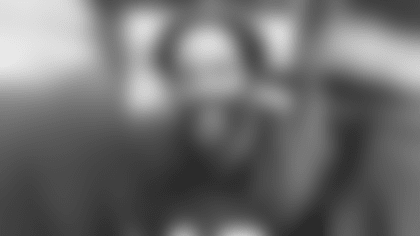They've answered the call this weekend for that long overdue pilgrimage to the pro football shrine in Canton, Ohio to honor their husband, father, grandfather, teammate, coach, mentor, and friend.
From his hometown of Bartow, Fla., where he was born and died.
From Tallahassee, where he played and coached and became synonymous with the Florida A&M Rattlers.
From New York, where they wrote a book about his role in sports helping integrate the America of the late 1960s as one of black college football's greatest quarterbacks.
From Cincinnati, where he became "The Rattler," in a 15-year career for the Bengals that began in the sixth round and spanned 207 games, three decades, four presidents, the AFL, a Super Bowl, and those 65 interceptions.
His first one came off Denver's Pete Liske, born during World War II. His last came off Minnesota's Wade Wilson, whose final NFL pass came in the year when current Bengals sixth-round pick Brad Robbins was born.
When he's inducted into the Pro Football Hall of Fame Saturday in a noon ceremony (NFL Network, ESPN), it comes 40 years after that last interception gave him the fourth most of all-time. In those ensuing four decades, only one man had more: Rod Woodson, born in 1965, the year Kenneth Jerome Riley graduated from Union Academy and went off to FAMU.
But not before he told her he'd be back to marry her.
Barbara Riley: "We started dating in the fall of '64. He was a senior. I was a sophomore. I say my neighbor, we called her Dixie, introduced us. She came up to me and said, 'I know somebody who wants to meet you.'
And I said, 'Who?' And she said Ken Riley. I said OK, because I was on my lunch break. After you got done eating you could go sit outside. OK, if you want to meet me, this is where I'll be. And then she went to him and told him that I wanted to meet him.
"And I had no interest in Ken Riley. Boyfriends didn't matter to me. I wasn't in school to find somebody. I wasn't going with anybody. He was my first boyfriend. I talked to boys, but nothing serious. No dating. Until he came along and that was it.
"I was a cheerleader. I knew who he was. He was the quarterback and class president and all of that. Everybody knew who he was. He said he knew he was going to marry me, but I had no inkling about marriage. He said when he met me, that was it."
Samuel Freedman, author of "Breaking the Line: The Season in Black College Football That Transformed the Sport and Changed the Course of Civil Rights."
Freedman, the Columbia University professor who'll be wearing a No. 13 Riley shirt in Saturday's crowd as a guest of the family, made Riley and Grambling quarterback James "Shack," Harris the central characters of his book.
"I met him in July of 2006. The interview I did with him was one of the very first interviews I did for the entire book. Out of the book came a great friendship. I was at his golf tournament in May of 2019 (the last one before Riley died.) For those 13 years, I was around him in all kinds of settings. He was someone of great integrity, great intelligence, focus, self-discipline. Generosity of spirit.
"When the book was done, I told Ken and Shack,' I so appreciate all the time you've given to me and all the trust you've placed in me, I'd like to make a donation in your honor for whatever charity you designate.' Ken asked for it to go to (his high school) Union Academy. He was still thinking about, 'How am I going to give back to the community?'
"One detail I love that once came up in our conversations is what made him most proud. Maybe he would say being in the Super Bowl or 65 interceptions. His career at FAMU. But what he said was his greatest source of pride is that he and everyone in his family had earned a master's degree."
Louis Breeden, who started on the Bengals other corner in Super Bowl XVI:
"The biggest thing for me is there is excitement and happiness. But there's a bit of sadness because he's not here. There is a cloud of sadness. I think I've told you before, he had 65 interceptions, so nothing has changed except for the minds of people. He should have gotten this years ago. I just keep thinking of that.
"I would love to see him accept the award and hear him. That's not going to happen. Riley? He'd be thanking all the folks that helped him. Jake Gaither (his college head coach) and all his teammates and things like that. I think more than anything, that's what he would talk about. Especially about his family. He put a lot of stock in his family and teammates."
Reggie Williams, who began a career as the Bengals' most prolific linebacker in Riley's last eight seasons:
"I'm in central Florida, where Ken Riley is a hero. He was one of my best friends down here … Greatest defensive player in Cincinnati Bengals history.
"This is something that Ken Riley really wanted to happen. He was very humble. But he knew what he accomplished. There was no way you could take away 65 interceptions from him because he knew that was one of the most by any player in NFL history. He was somewhat confident justice would be served and he would get his due. But he didn't rave about it. He never went on rants about it. He felt the truth would eventually reveal itself. As one the best defensive backs in all of NFL history."
Ken Anderson, Bengals quarterback who played 13 seasons with Riley and Hall of Fame senior finalist:
"He made everybody better. When you're going against a corner of that caliber, you had to be on your game. What he was really good at was helping young guys. You talk to (wide receiver) Isaac Curtis about when he was coming up and after he ran a route,(Riley) would say, 'Here's why I jumped the route.' So he would help the receivers on what they were tipping off, too.
"One of the reasons for his success was he was a quarterback, so he had to learn defense from a quarterback standpoint. You had to be on top of your game every time. Your eyes couldn't tip things off, your feet couldn't tip things off. Otherwise, you had no chance. Kenny was a true pro. Quiet? Yeah, but he was a leader and everyone listened to what he said."
REGGIE WILLIAMS: "He was a mentor in a lot of ways.
"Probably my very first time starting for the Bengals coming off the bench against Houston and at that time linebackers could hit wide receivers as much as they wanted within five yards. I had to go up against Kenny Burrough, who Rattler knew well from playing against him in college. And I wouldn't let him get past the five yards.
"As I'm walking back to the huddle, Ken Burrough was asking Ken Riley, 'What's wrong with that rookie? That rookie is crazy. How does he play that way?'
"And Kenny was like, 'Yeah he's crazy, man, you have to watch out for him.' When he got back to the huddle, he said, 'Reg, keep doing what you're doing.' That was such an injection of confidence that I needed at that time as a rookie."
BREEDEN: "He taught me how to play cornerback in the NFL. I had to learn from Kenny and Lemar (Parrish, the other starting cornerback when Breeden broke in.) Mostly Kenny. Maybe it was because he was a quarterback it was his nature to help people as much as he could. He helped me from the beginning.
"The amazing thing about the Ken Riley story is how he made that transition from quarterback to cornerback. It not only showcased his athleticism, but you have to tackle people. Be aggressive and hit people. Not everybody would do that. Wow, he had to be a tough type of quarterback to make that jump."
"He wasn't a yeller and a screamer. I could do that. You need that calming influence in the locker room. That's where the quarterback comes from. If you're playing quarterback, you can't be raving. You have to go to the next play. But he talked. He just wasn't flashy … There is a truth that the more outrageous and demonstrative you are, you get attention. You know how Lemar was, he let you know when he made a great play. Kenny wasn't doing any of that. I remember one time hearing Lemar talking to a group of us and he said even though he played only half a season, he knew was going to make the Pro Bowl. And Kenny never made one when he also deserved it."
BARBARA RILEY: I didn't look at the football part of the man. I looked at the man himself. I wasn't in love with what he was doing. Because he was playing football. There was nothing like that. I always looked at the man and not what he was doing. We grew together. He was quiet. He was a God-fearing man. It was his personality.
"He proposed around Christmas of 1968. Then in '69 he called me and said the Cincinnati Bengals had drafted him. The first thing I said was, 'Who are the Cincinnati Bengals?' I had never heard of them. It was their second year. I had heard of the Green Bay Packers. He never discussed that (football)part, even with family or his closest friends.
"I said, 'Well, you always have your education if things don't work out.' That's how I looked at it. Just as casual as that. I always looked at football as his job. And I wouldn't tell people what he did unless they asked me. If they didn't ask me, I didn't say anything. Same with the children."
REGGIE WILLIAMS: "There were a lot of things unresolved when Kenny came out of college. It was the spring after Martin Luther King Jr. got killed. There were race riots across the country. It was very important for athletes to be teammates, for black and white to get along. It took special leaders like Ken Riley to make it a non-issue.
"During the pandemic, I went to Ken Riley's funeral and I was very, very pleased to see Kenny Anderson there. It's one of those situations where it's like he represented the white players of Cincinnati without really trying to, but it was just something that showed the great side of Kenny Anderson that he showed up for Ken Riley's funeral."
FREEDMAN: "He didn't talk that much about (race). I found out more about the racial violence in the part of Florida where he grew up in doing research. It was nothing that he brought up. I think it goes with sort of his dignity in the sense that his role was to surmount it all and to live in a way that put him above it all. In denying the existence of it was like this principled commitment not to be broken by it."
REGGIE WILLIAMS: "He was the only Alpha Phi Alpha fraternity brother that I had in my 14-year career with the Bengals. He immediately welcomed me into the huddle the first time I walked in on the right side at linebacker the first time I played. It was against Cleveland. He whispered in my ear, 'Invictus," a poem by William Ernest Henley
that almost every member of Alpha Phi Alpha memorized. A poem about standing up and overcoming adversity, which Ken Riley did his entire 15-year career."
BREEDEN: "The thing I remember about his last game (at home on Ken Riley Day) is we were all yelling and screaming "Rattler." So were people in the stands, some maybe who didn't know what a rattler was. He went out on his own. There's no better way. It's incredible. That's 15 years performing as a high-level starter. (Note: Riley led the AFC in interceptions in his final two seasons.)
"When he got the head coaching job (at FAMU), he asked me to come down and coach the DBs. I thought about it for three weeks, but I didn't do it. Coaching is a passion and he had it."
BARBARA RILEY: "He said he was going to go out on top while he was at the top of his game. And that's the way he put it. 'They don't have to tell me to leave. He said I know my body and the only person who can know your body is you.' Perspiration would cover him. One game they had to take him to the hospital for fluids and he said, 'OK, I know this is going to be my last year.' That had never happened before. When he said that, that was it."
SAM FREEDMAN: "Ken really believed his body of work should stand on its own. He had no desire to campaign for himself or to try to do anything to put him in the media spotlight in the hopes that would remind Hall voters, 'Hey, I'm still out here.' He had this incredible faith the quality of his career was going to be recognized and that faith was validated.
"As much as we know that he's a person of great faith, he's looking down on these events with great satisfaction. His loving family will be there to represent him. I just wish justice had been done on the timetable that it deserved to be done."







